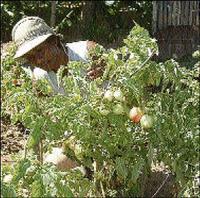Tendai Franklyn-Brown, Staff Reporter

Howard Tate, a small farmer in Lakes Pen, St Catherine, tends to tomatoes grown from seeds he received from Food For the Poor's Rural Economic Agricultural Programme (REAP). REAP has assisted 45,000 farmers and their dependents to recover from Hurricane Ivan, or start small farming projects, by providing seeds, tools and other forms of support. - file
Against the background of rising food prices and a global food shortage, the Consumer Affairs Commission (CAC) is encouraging more persons to get involved in backyard farming to reduce the country's dependence on imports.
Callaloo, a popular vegetable that can be grown in the backyard, is an excellent source of iron, as pointed out by the CAC.
"If you have bought callaloo, save the stalks from the bottom and plant these in your small bed or container. In a short time you will have beautiful new callaloo plants from which to cut the leaves," the CAC advised in a recent release to the media. "Have a lime drink with it. This helps to release the iron in callaloo more quickly," the release added.
Offsetting costof shopping
Backyard gardening or courtyard gardening, as it is known, does not require large spaces. Vegetables such as lettuce, callaloo, hot pepper, scallion and cucumber can be grown in a small area with just 10-12 inches of soil. This form of gardening can actually assist with feeding the family, as goods produced can offset the cost of supermarket purchases.
However, the key to cultivating successfully is dependent on the richness of the soil. This could, in fact, be a mixture of soil, sand and rotted vegetables, leaves and grass cuttings. Fruit and vegetable peels from cooking can be used to further enrich the soil.
Utilising garden space
Egg containers are particularly useful when growing lettuce, tomatoes and parsley, which can be transferred to a small bed.
To utilise garden space efficiently when growing vegetables, rows should be allocated to tomatoes, string beans, lettuce, with scallion and thyme placed at the front of the bed. Okras tend to fare well, when placed behind vegetables, as they grow tall.
Recycling water from the bath can be used as an economical way of watering the garden. Covering garden beds with grass cuttings and leaves can minimise the amount of water used as it reduces evapora-tion and the growth of weeds.
tendai.franklyn-brown@gleanerjm.com
Jamaica's Food crisis


